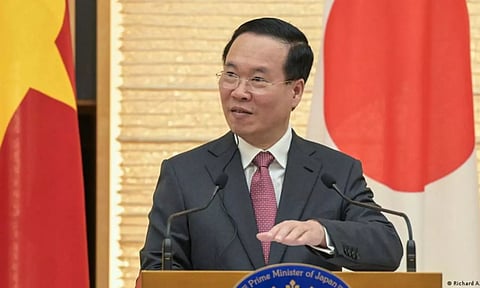

• DAVID HUTT
UNITED NATIONS: Vietnam’s one-party, Communist system was once known for its predictability. But President Vo Van Thuong’s abrupt resignation on Wednesday — after just a year in the post, making him the shortest-serving president of the communist state — points to increasingly chaotic politics in Hanoi. The Vietnamese Communist Party’s Central Committee met on Wednesday to accept Thuong’s resignation due to “violations” and “shortcomings,” the Communist Party has officially said. The resignation was also approved by the country’s parliament on Thursday. Many Vietnam-watchers had been predicting his downfall for weeks.
Thuong is now the second president to resign in as many years amid a massive anti-corruption crackdown that has taken down many of the Southeast Asian nation’s top politicians. Over the past 18 months, not only have two presidents been forced to resign, but two deputy prime ministers and another member of the Politburo have also been dismissed. The Politburo that was selected at the last National Congress in 2021 has been cut from 18 members to 14, making it the smallest in recent history.
Thuong’s downfall is likely the result of ongoing investigations involving the real estate firm Phuc Son Group, which is accused of flagrant corruption in Quang Ngai province, of which Thuong was party chief between 2011 and 2014.
According to some media reports, one of Thuong’s relatives is accused of accepting a 2 million euros ($2.18 million) bribe from the real estate group. The current People’s Committee chairman of Quang Ngai province, Dang Van Minh, and the former chairman, Cao Khoa, were arrested in early March over this scandal. Nguyen Xuan Phuc, Thuong’s predecessor as president, resigned last year for the “violations and wrongdoing” by officials under his control, which are believed to refer to corruption in government during the COVID-19 pandemic. Thuong entered office claiming that he was “determined to fight corruption” in line with the so-called “blazing furnace” anti-graft campaign of Nguyen Phu Trong, the general secretary of the Communist Party.
Although Trong became party chief in 2012, he only consolidated his power in 2016 after defeating his main rival, then prime minister Nguyen Tan Dung, at that year’s National Congress.
Dung was widely seen as a figurehead of a faction of the Communist Party that was perceived as accepting corruption as a way of binding the party apparatus together. It was also seen as eschewing socialist ideology. Trong, who spent most of his career in the Communist Party’s theoretical wing, has sought to restore ideology and “socialist ethics” to the foreground of politics, and unleashed a vast anti-corruption campaign that has now taken down many of the country’s most powerful politicians.
While that campaign has to some degree cleaned up politics, it has also unhinged the norms and stabilising mechanisms of Vietnam’s repressive and hierarchical one-party system, leading to ever greater instability. Ever since the 1990s, the Communist Party has functioned by accepting a number of unwritten and codified rules, including a two-term limit for senior politicians, a retirement age of 65 and a separation of powers between the country’s four main political posts.